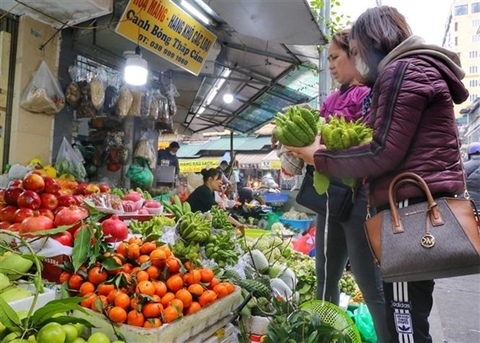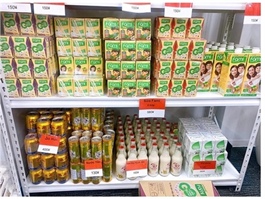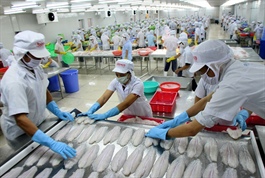Vietnamese fruits struggle to stand out in domestic market
Vietnamese fruits struggle to stand out in domestic market
Viet Nam has been focusing on exporting fruits rather than meeting domestic demand, leading to a monopoly by imports, analysts said.

People buy fruits at a traditional market in Ha Noi. — VNA/VNS Photo |
Many tropical fruits from Thailand and China like durian, rambutan, mango, and pineapple, dominate the market while local produce can be found only in season and in modest volumes.
Mangoes from China arrived in HCM City earlier than normal and in bigger sizes, and are more popular than domestic varieties.
The owner of a fruit stall on Tran Khac Chan Street (District 1) was quoted by Nguoi Lao Dong newspaper as saying that Vietnamese mangoes still struggle to compete though they are in season and, at VND25,000-50,000 per kilogramme, are cheaper.
Domestic oranges have also seen a decrease in sales at Ba Chieu Market (Binh Thanh District), despite only costing half the price of imports.
According to Deputy Director of the Thu Duc Trading and Import Export JSC Nguyen Binh Phuong, imported fruits easily beat Vietnamese products in terms of quality, appearance and packaging.
“There have only been minor improvements to domestic products, most of which is to meet export standards.”
Fruit exporters said it would be challenging to sell domestically since supermarkets pay low prices but require fruits to meet export standards.
A retailer explained: “Fruits from other countries are shipped in container units, making it easier for us to have strategic selling plans compared to local products.”
Since customers prefer imported fruits for their appealing appearance and packaging, local suppliers should focus on improving their products.
Vo Thanh Loc, marketing director of Farmers Market, said nowadays customers prioritise quality and prices, for instance preferring mini pineapple and durian from Thailand for their unique flavours and reasonable prices.
“Vietnamese durians are more expensive due to their large size, which makes it harder for customers to buy compared to those from Thailand that are smaller and more reasonably priced.”
Dang Phuc Nguyen, general secretary of the Viet Nam Fruit Association, said most of Viet Nam’s main fruits are grown to meet Chinese demands, and so it is challenging to resell them in the domestic market if they are not exported.
He said farmers should invest in developing new varieties and improving packaging to meet domestic demand, and local fruits should be reasonably sized and flavourful.























